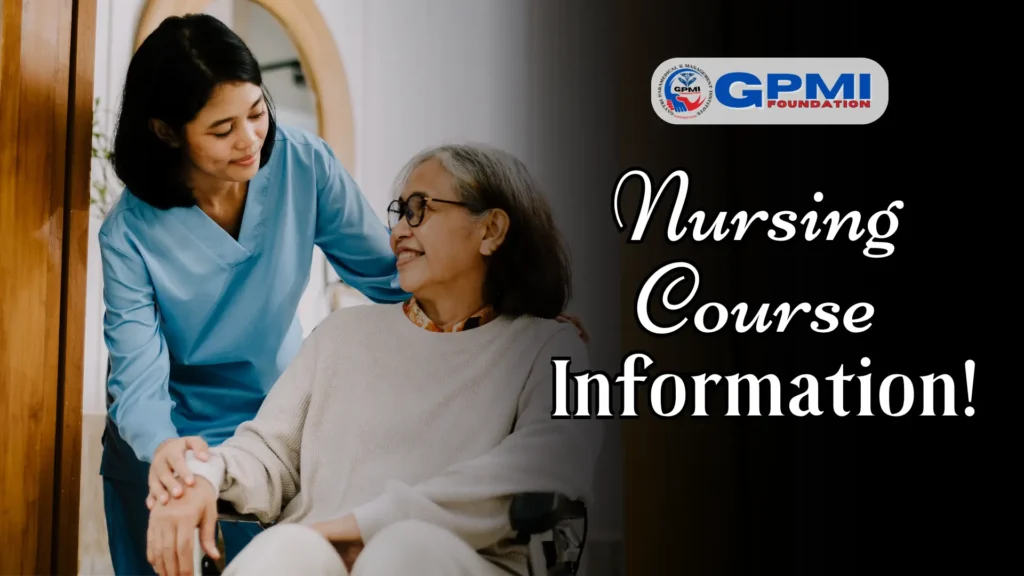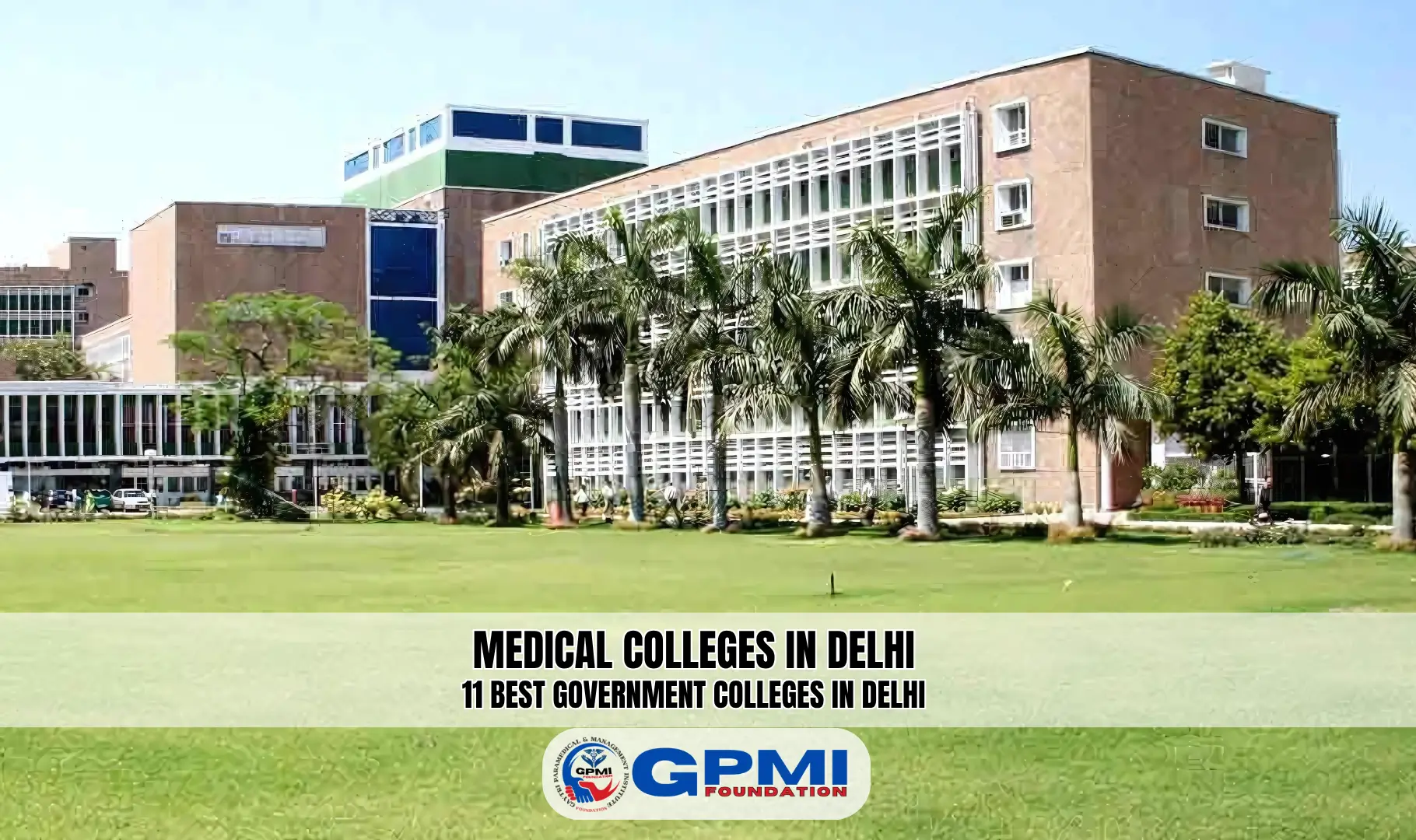Choosing a career in nursing course after 12th grade can open doors to a stable and rewarding future. Nursing is a noble profession that plays a vital role in healthcare. It involves caring for patients, assisting doctors, and ensuring the smooth functioning of medical facilities.
With the growing demand for healthcare services, trained nurses are needed in hospitals, clinics, and nursing homes. A nursing course equips students with essential skills like patient care, medical procedures, and emergency response.
It also offers job security and opportunities for career growth. After completing a nursing program, students can work as nursing assistants or staff nurses or even pursue higher studies for advanced roles.
The best part is that nursing is not just a job—it is a profession filled with compassion, respect, and the chance to make a difference in people’s lives. If you have a passion for helping others, nursing could be your perfect career.
Table of Contents
What is Nursing?
Nursing is a healthcare profession focused on caring for individuals, families, and communities to help them maintain or recover good health. Nurses play a crucial role in medical settings by assisting doctors, monitoring patients, administering medications, and providing emotional support.
They work in hospitals, clinics, nursing homes, and even in-home healthcare. Nursing is not just about medical treatment—it also involves compassion, patience, and dedication to helping others.
Nurses are trained in medical procedures, emergency care, and patient management, making them an essential part of the healthcare system.
What is Nursing Course?
A nursing course is a professional training program that prepares students for a healthcare career. It teaches essential skills like patient care, medical procedures, emergency response, and hospital management.
Nursing courses are available at different levels, including diploma, undergraduate, and postgraduate programs. Students learn about human anatomy, pharmacology, first aid, and nursing ethics.
After completing a nursing course, graduates can work as nursing assistants, staff nurses, or even specialize in advanced medical fields. These courses provide job security, career growth, and the opportunity to serve society by caring for the sick and injured.
Nursing Course Information
Now, we will explore detailed information about nursing courses, covering their types, eligibility, duration, syllabus, and career opportunities to help you understand the right path for your future. Nursing courses are available at different levels, catering to various career goals. The main types include:

- Diploma in Nursing – 2-3 Years courses like ANM (Auxiliary Nurse Midwifery) and GNM (General Nursing and Midwifery).
- Undergraduate Nursing Courses 4 years – BSc nursing course and Post Basic Nursing Course.
- Postgraduate Nursing Courses – M.Sc. Nursing and specialized nursing programs.
- Certificate Nursing Courses – Short-term, 6-month nursing course in specific nursing skills.
Each course prepares students for different roles in the healthcare industry.
ANM Nursing Course Details
ANM (Auxiliary Nursing and Midwifery) is a 2-year diploma course designed to train students in basic nursing care, midwifery, and community healthcare services. ANM nurses work in hospitals, clinics, rural healthcare centers, maternity wards, and NGOs, providing primary healthcare support.
| Feature | Details |
|---|---|
| Course Name | Auxiliary Nursing and Midwifery (ANM) |
| Course Duration | 2 years (including internship) |
| Eligibility | 10+2 (Science/Arts/Commerce) with a minimum of 40%-50% marks |
| Admission Process | Merit-based or entrance exam (varies by state/institute) |
| Course Level | Diploma |
| Age Limit | 17 – 35 years |
| Internship | 6 months mandatory |
| Regulatory Body | Indian Nursing Council (INC) & State Nursing Councils |
| Job Roles | Staff Nurse, Midwife, Community Health Worker |
| ANM Nursing Course Fee in India | In Government Colleges ₹20,000 – ₹80,000 In Private Colleges ₹1,50,000 – ₹7,50,000 |
ANM Nursing Course Syllabus
The ANM curriculum covers nursing, midwifery, and community health topics:
First Year:–
- Anatomy & Physiology
- Fundamentals of Nursing
- Community Health Nursing
- Primary Healthcare & Nutrition
- First Aid & Emergency Care
- Environmental Hygiene
Second Year & Internship:-
- Midwifery & Child Health Nursing
- Maternal & Newborn Care
- Health Promotion & Family Welfare
- Communicable Diseases & Immunization
- Internship (Maternity Wards, Clinics, PHCs)
ANM Job Roles:
- Staff Nurse – Hospitals, clinics, and healthcare centers
- Community Health Worker – Rural & urban health programs
- Home Care Nurse – Assisting elderly and disabled patients
- Midwife – Maternity hospitals & birthing centers
- NGO & Government Health Projects – Immunization, family planning, maternal care
Higher Studies After ANM:
- GNM Nursing (3 years) – To become a registered nurse
- Post Basic B.Sc. Nursing – Upgrade to a graduate-level nurse
- Specialized Nursing Courses – ICU, Pediatrics, Midwifery
Salary After ANM Nursing
- Freshers: ₹12,000 – ₹25,000 per month
- Experienced Nurses: ₹30,000 – ₹50,000 per month
- Abroad (Gulf, UK, Canada): ₹1.5 – ₹3 lakh per month (after clearing licensing exams)
GNM Nursing Course Details
GNM (General Nursing and Midwifery) is a 3-year diploma course designed to train students in patient care, medical assistance, and midwifery services. It prepares students to become professional nurses capable of working in hospitals, clinics, nursing homes, and community healthcare centers.
| Feature | Details |
|---|---|
| Course Name | General Nursing and Midwifery (GNM) |
| Course Duration | 3 years + 6 months internship |
| Eligibility | 10+2 (Science/Arts) with a minimum of 40%-50% marks |
| Admission Process | Merit-based or entrance exam (varies by state/institute) |
| Course Level | Diploma |
| Age Limit | 17 – 35 years |
| Internship | 6 months mandatory |
| Regulatory Body | Indian Nursing Council (INC) & State Nursing Councils |
| Job Roles | Staff Nurse, OT Nurse, ICU Nurse, Community Health Nurse |
| GNM Nursing Course Fee in India | In Government Colleges ₹30,000 – ₹1,50,000 In Private Colleges ₹1,50,000 – ₹7,50,000 |
GNM Nursing Course Syllabus
The GNM curriculum includes theory and practical training in various aspects of nursing:
First Year
- Anatomy & Physiology
- Microbiology
- Psychology
- Fundamentals of Nursing
- First Aid
- Community Health Nursing
Second Year
- Medical-Surgical Nursing
- Pharmacology
- Mental Health & Psychiatric Nursing
- Communicable Diseases
- Pediatric Nursing
Third Year & Internship
- Midwifery & Obstetric Nursing
- Community Health Nursing II
- Nursing Administration & Ward Management
- Internship (Hospital & Community Training)
GNM Job Roles:
- Staff Nurse – Hospitals, clinics, and healthcare centers
- Community Health Nurse – Government health programs
- ICU/OT Nurse – Assisting in intensive care units and surgeries
- Home Care Nurse – Provides healthcare services at home
- Railway & Military Nurse – Indian Railways & Armed Forces Medical Services
- Emergency Care Nurse – Working in trauma and emergency wards
Higher Studies Options After GNM:
- Post Basic B.Sc. Nursing – 2-year course to upgrade qualifications
- B.Sc. Nursing (Lateral Entry) – Direct entry into the second year
- Specialization Courses – ICU, Oncology, Critical Care Nursing
Salary After GNM Nursing
Freshers: ₹15,000 – ₹30,000 per month
- Experienced Nurses: ₹40,000 – ₹60,000 per month
- Abroad (UK, Canada, Gulf): ₹2 – ₹5 lakh per month (after clearing licensing exams)

BSc Nursing Course Details
The Bachelor of Science in Nursing (B.Sc. Nursing) is a 4-year undergraduate program that prepares students for a professional career in healthcare, hospitals, and nursing education. It focuses on patient care, clinical procedures, and medical research.
| Features | Details |
|---|---|
| Course Name | B.Sc. Nursing |
| Bsc Nursing Course Duration | 4 Years |
| Eligibility | 10+2 (Science) with Physics, Chemistry, Biology, and English (PCB) with at least 45-50% marks |
| Admission Process | Entrance Exam or Merit-Based |
| Regulatory Body | Indian Nursing Council (INC) & State Nursing Councils |
| Internship | 6-month mandatory clinical internship in hospitals |
| Career Opportunities | Staff Nurse, Nursing Officer, ICU Nurse, Public Health Nurse, Military Nurse, Researcher, Nurse Educator |
| BSc Nursing Course Fees | Government Colleges ₹32,000 – ₹2,00,000 Private Colleges ₹4,00,000 – ₹12,00,000 |
Syllabus & Subjects
The curriculum includes theoretical and practical training in medical sciences and patient care. Some core subjects are:
- 1st Year: Anatomy, Physiology, Biochemistry, Psychology, and Nursing Foundations
- 2nd Year: Pharmacology, Microbiology, Medical-Surgical Nursing, and Pathology
- 3rd Year: Child Health Nursing, Mental Health Nursing, and Community Health Nursing
- 4th Year: Midwifery & Obstetric Nursing, Research & Statistics, and Nursing Management
Job & Salary After B.Sc. Nursing Course
After completing B.Sc. Nursing, graduates can work in hospitals, clinics, military services, nursing colleges, and research institutions.
| Job Role | Salary Range (Per Month) |
|---|---|
| Staff Nurse | ₹25,000 – ₹50,000 |
| ICU Nurse | ₹35,000 – ₹70,000 |
| Nursing Educator | ₹40,000 – ₹80,000 |
| Military Nurse | ₹50,000 – ₹1,00,000 |
| Hospital Administrator | ₹60,000 – ₹1,50,000 |
PB Nursing Course Details
Post Basic B.Sc. Nursing (PB B.Sc. Nursing) is a 2-year undergraduate program designed for Registered Nurses (RNs) with a General Nursing and Midwifery (GNM) diploma. It helps nurses upgrade their skills and qualify for higher positions in hospitals, nursing colleges, and healthcare organizations.
| Course Name | Post Basic B.Sc. Nursing (PB B.Sc. Nursing) |
|---|---|
| Duration | 2 Years |
| Eligibility | GNM Diploma + Registered Nurse (RN) Certificate from a recognized nursing council |
| Admission Process | Entrance Exam / Merit-Based |
| Regulatory Body | Indian Nursing Council (INC) & State Nursing Councils |
| Internship | 6 months (Compulsory practical training) |
| Career Opportunities | Staff Nurse, Nursing Officer, Nurse Educator, Community Health Nurse, Military Nurse |
| PB B.Sc. Nursing Course Fees | Government Colleges ₹20,000 – ₹1,00,000 Private Colleges ₹2,00,000 – ₹5,00,000 |
Syllabus & Subjects
PB B.Sc. Nursing includes advanced clinical training and nursing management. Some core subjects are:
- 1st Year: Psychology, Microbiology, Nursing Foundation, Nutrition & Dietetics
- 2nd Year: Community Health Nursing, Midwifery & Obstetrical Nursing, Research & Statistics, Management of Nursing Services
Job & Salary After PB B.Sc. Nursing Course
After completing the PB B.Sc. Nursing graduates can work in hospitals, research centers, defense services, and nursing colleges.
| Job Role | Salary Range (Per Month) |
|---|---|
| Staff Nurse | ₹30,000 – ₹60,000 |
| Nursing Educator | ₹40,000 – ₹80,000 |
| Community Health Nurse | ₹35,000 – ₹70,000 |
| Hospital Administrator | ₹50,000 – ₹1,20,000 |
MSc Nursing Course Details
The Master of Science in Nursing (M.Sc. Nursing) is a 2-year postgraduate program designed to provide specialized knowledge and advanced clinical training in nursing. It prepares students for hospital leadership roles, nursing education, research, and healthcare management.

| Course Name | M.Sc. Nursing |
|---|---|
| Duration | 2 Years |
| Eligibility | B.Sc. Nursing / PB B.Sc. Nursing with at least 55% marks + 1-year work experience |
| Admission Process | Entrance Exam / Merit-Based |
| Regulatory Body | Indian Nursing Council (INC) & State Nursing Councils |
| Internship | 6 months (Compulsory clinical training) |
| Career Opportunities | Nurse Educator, Nursing Supervisor, Researcher, ICU Nurse, Public Health Nurse, Military Nurse |
| M.Sc. Nursing Course Fees | Government Colleges ₹40,000 – ₹1,60,000 Private Colleges ₹3,00,000 – ₹8,00,000 |
Specializations in M.Sc. Nursing
Students can choose specialized fields such as:
- Medical-Surgical Nursing
- Obstetrics & Gynecology Nursing
- Community Health Nursing
- Psychiatric (Mental Health) Nursing
- Pediatric Nursing
- Critical Care Nursing
M.Sc. Nursing Syllabus & Subjects
M.Sc. Nursing includes advanced theoretical knowledge, research work, and clinical training. Some core subjects are:
- 1st Year: Advanced Nursing Practice, Nursing Research & Statistics, Clinical Specialization, Nursing Education
- 2nd Year: Nursing Management, Epidemiology & Public Health, Specialization-Specific Training, Dissertation & Research Work
Job & Salary After M.Sc. Nursing
After completing M.Sc. Nursing, graduates can work in hospitals, nursing colleges, research centers, and administrative roles.
| Job Role | Salary Range (Per Month) |
|---|---|
| Nurse Educator | ₹50,000 – ₹1,20,000 |
| Nursing Supervisor | ₹40,000 – ₹90,000 |
| ICU Nurse Specialist | ₹50,000 – ₹1,00,000 |
| Hospital Administrator | ₹60,000 – ₹1,50,000 |
| Researcher | ₹70,000 – ₹1,50,000 |
Short-Term Certificate & Diploma in Nursing Course
A 6 Months Nursing Course & a 1-year nursing course are called short-term programs designed for students who want to enter the healthcare field quickly. Some popular 6 months to 1-year nursing courses include:
- GDA Nursing Course (General Duty Assistant) – Trains students in basic patient care and hospital support.
- Certificate in NCA (Nursing Care Assistant) – Focuses on assisting nurses with patient care and hygiene.
- DNA (Diploma in Nursing Assistant) – Covers basic nursing skills, first aid, and patient handling.
These courses prepare students for entry-level roles in hospitals, clinics, and home healthcare services.
Nursing Course Fees in Government College
Below is an estimated fee structure for different nursing courses offered in government colleges:
| Course | Duration | Annual Fee Range | Total Course Fee |
|---|---|---|---|
| ANM (Auxiliary Nursing & Midwifery) | 2 Years | ₹10,000 – ₹40,000 | ₹20,000 – ₹80,000 |
| GNM (General Nursing & Midwifery) | 3 Years | ₹10,000 – ₹50,000 | ₹30,000 – ₹1,50,000 |
| B.Sc. Nursing | 4 Years | ₹8,000 – ₹50,000 | ₹32,000 – ₹2,00,000 |
| M.Sc. Nursing | 2 Years | ₹20,000 – ₹80,000 | ₹40,000 – ₹1,60,000 |
Additional Costs
- Hostel & Accommodation: ₹20,000 – ₹50,000 per year
- Examination & Registration Fees: ₹5,000 – ₹15,000 per year
- Books & Study Materials: ₹5,000 – ₹20,000 for the entire course
- Uniform & Clinical Equipment: ₹5,000 – ₹10,000
Best Nursing Colleges in India
India boasts numerous esteemed institutions offering B.Sc. Nursing programs. Here are some of the top nursing colleges in the country:
- All India Institute of Medical Sciences (AIIMS), Delhi: A premier medical institution offering a comprehensive B.Sc. Nursing program.
- Christian Medical College (CMC), Vellore: Renowned for its quality nursing education and training facilities.
- Postgraduate Institute of Medical Education and Research (PGIMER), Chandigarh: Offers advanced nursing programs with a focus on research and clinical practice.
- Armed Forces Medical College (AFMC), Pune: Provides nursing education with an emphasis on military medical services.
- Manipal College of Nursing, Manipal: Known for its robust curriculum and state-of-the-art facilities.
- Amrita College of Nursing, Kochi: Offers a well-structured B.Sc. Nursing program with modern facilities.
- B.M. Birla College of Nursing, Kolkata: Provides quality nursing education with experienced faculty.
- Father Muller College of Nursing, Mangalore: Known for its comprehensive nursing programs and clinical exposure.
- Rajkumari Amrit Kaur College of Nursing (RAKCON), Delhi: Specializes in nursing education with a focus on practical training.
- St. Stephen’s Hospital College of Nursing, Delhi: Provides a balanced approach to theoretical and practical nursing education.
Admission to these colleges typically requires completion of 10+2 with Physics, Chemistry, Biology, and English, along with qualifying entrance exams like NEET. It’s advisable to check each institution’s official website for detailed admission criteria and application deadlines.
Top 10 BSc Nursing Colleges in Delhi
Here are some of the top B.Sc. Nursing colleges in Delhi:
- All India Institute of Medical Sciences (AIIMS), Delhi: A premier medical institution offering a comprehensive B.Sc. Nursing program.
- Guru Gobind Singh Indraprastha University (GGSIPU): Known for its quality education in nursing and allied health sciences.
- Jamia Hamdard: Offers a well-structured B.Sc. Nursing course with modern facilities.
- Lady Hardinge Medical College (LHMC): A renowned institution dedicated to women’s education in nursing.
- Vardhman Mahavir Medical College (VMMC): Provides a robust curriculum in nursing education.
- Rajkumari Amrit Kaur College of Nursing (RAKCON): Specializes in nursing education with a focus on practical training.
- Rufaida College of Nursing: Offers quality nursing education with experienced faculty.
- Lakshmi Bai Batra College of Nursing: Known for its state-of-the-art facilities and comprehensive nursing programs.
- St. Stephen’s College of Nursing: Provides a balanced approach to theoretical and practical nursing education.
- Apollo School of Nursing: Affiliated with the Apollo Hospitals group, offering extensive clinical exposure.
Admission to these colleges typically requires completion of 10+2 with Physics, Chemistry, Biology, and English, along with qualifying entrance exams like NEET. It’s advisable to check each institution’s official website for detailed admission criteria and application deadlines.
Career Scopes After Nursing Courses
Nursing is one of the most respected and in-demand professions worldwide. After completing a nursing course, candidates can explore diverse career opportunities in hospitals, clinics, community healthcare, research, and even international healthcare sectors.

The career scope depends on the type of nursing qualification:
1. Career Opportunities After ANM
ANM is a 2-year diploma course that focuses on maternal and child healthcare. ANM graduates can work in:
- Community Health Centers – Provide basic healthcare in rural and urban areas.
- Primary Health Clinics (PHCs) – Work as a healthcare assistant for doctors.
- Home Nursing Services – Offer patient care at home for elderly or disabled patients.
- Maternity & Child Welfare Centers – Assist in prenatal and postnatal care.
- NGOs & Government Health Schemes – Work in national programs like Anganwadi and ASHA schemes.
2. Career Opportunities After GNM
GNM is a 3-year diploma course that provides training in patient care, surgical assistance, and nursing management. Career options include:
- Staff Nurses in Hospitals & Clinics – Work in private or government hospitals.
- Emergency Care Nurse – Assist in trauma care, ICUs, and emergency wards.
- Nursing Supervisor – Manage junior nurses in healthcare settings.
- Home Care Nurse – Provide medical care to patients at home.
- Occupational Health Nurse – Work in industries, ensuring employee health and safety.
- Railway & Defense Nurses – Opportunities in Indian Railways and Armed Forces Medical Services (AFMS).
3. Career Opportunities After B.Sc. Nursing
B.Sc. Nursing is a 4-year degree course that offers wider career options, including:
- Registered Nurse (RN) – Work in government and private hospitals with better salary packages.
- ICU Nurse, OT Nurse, or Critical Care Nurse – Specialized roles in Operation Theaters and Intensive Care Units.
- Nursing Officer in Government Hospitals – Secure jobs through AIIMS, ESIC, and State PSC exams.
- Nursing Tutor / Lecturer – Teach in nursing colleges after gaining experience.
- Clinical Research Nurse – Work in pharmaceutical companies and research labs.
4. Career Opportunities After M.Sc. Nursing
For those who want to advance their nursing career, M.Sc. Nursing provides opportunities in:
- Nurse Educator / Lecturer – Teach in medical colleges and universities.
- Nursing Researcher – Conduct clinical trials and healthcare studies.
- Hospital Administrator – Manage healthcare facilities and staff.
- Nurse Practitioner (NP) – Work independently in specialized medical fields.
5. International Nursing Opportunities
Nurses with B.Sc. Nursing or higher qualifications can apply for high-paying jobs abroad after clearing licensing exams like:
- NCLEX-RN (USA & Canada)
- CBT & OSCE (UK)
- HAAD / DHA (UAE & Gulf countries)
- Australian Health Practitioner Regulation Agency (AHPRA) – Australia
In countries like the USA, UK, Canada, Australia, and the Gulf, nurses can earn ₹2–5 lakh per month with additional benefits like housing and medical allowances.
6. Entrepreneurship in Nursing
Experienced nurses can start their own ventures, such as:
- Home Nursing Services – Providing patient care at home.
- First Aid & Health Training Centers – Teaching basic medical care.
- Elderly Care & Rehabilitation Centers – Caring for aging populations.
With further studies and experience, nurses can reach leadership positions, specializing in critical care, pediatrics, oncology, or anesthesia, and even explore opportunities abroad.
Conclusion
A nursing course after the 12th is a great choice for those who want a stable and fulfilling career in healthcare. There are multiple pathways to enter nursing, including ANM (2 years), GNM (3 years), and B.Sc. Nursing (4 years and 1/2 year for internship), which offers opportunities in hospitals, clinics, and community health services.
Short-term courses like GDA (6 months–1 year) and Nursing Care Assistant (NCA) help students enter the field quickly. While GNM is a strong career option, those looking for higher salaries and career growth can pursue a B.Sc. Nursing, M.Sc. Nursing, or working abroad for better opportunities.
Though ANM is traditionally for females, GNM and B.Sc nursing is open to all. After GNM, nurses can work in hospitals but cannot open a clinic independently without a doctor’s partnership.
With the increasing demand for healthcare professionals, nursing offers job security, career advancement, and a chance to make a real difference in people’s lives.
Frequently Asked Questions
Here, we have compiled a list of frequently asked questions to provide you with detailed and refined information about the course.
Is a Nursing Course After 10th Possible?
Yes, a nursing course after the 10th is possible, but options are limited.
ANM – Some institutes accept 10th-pass students, but most require 12th.
GDA – A short-term course focusing on basic patient care.
NCA – Trains students in hygiene, patient handling, and first aid
Is ANM only for females?
No, ANM (Auxiliary Nurse Midwifery) is not exclusively for females. While women have traditionally pursued it due to its focus on maternal and child healthcare, male candidates can also apply in some institutes.
For male aspirants, GNM (General Nursing and Midwifery) or B.Sc. Nursing are better options
Is GNM a good career?
Yes, GNM is a good career choice, especially for those interested in healthcare. It offers stable job opportunities, career growth, and a chance to serve people. GNM graduates can work as staff nurses, assistants, home care nurses, or emergency care providers in hospitals, clinics, nursing homes, and community health centers.
Can I open a clinic after GNM?
No, GNM (General Nursing and Midwifery) graduates cannot open a clinic independently because they are not licensed doctors. However, they can work in hospitals, nursing homes, and community health centers or open a first-aid or nursing care center with proper approvals.
Can a nurse earn 1 lakh per month?
Yes, but it depends on experience, specialization, location, and job role.
Senior nurses in top hospitals can earn ₹50K–₹1Lakh per month.
Specialized Nursing (ICU, OT, Critical Care) – earn higher salaries.
In the countries like the USA, UK, Canada, or the Middle East earn ₹2–5 lakh monthly.
What is the shortest nursing course?
Some of the shortest nursing courses include:
First Aid & Emergency Care Course – 6 months
General Duty Assistant (GDA) – 6 months to 1 year
Nursing Care Assistant (NCA) – 6 months to 1 year
Certificate in Home Nursing – 6 months







